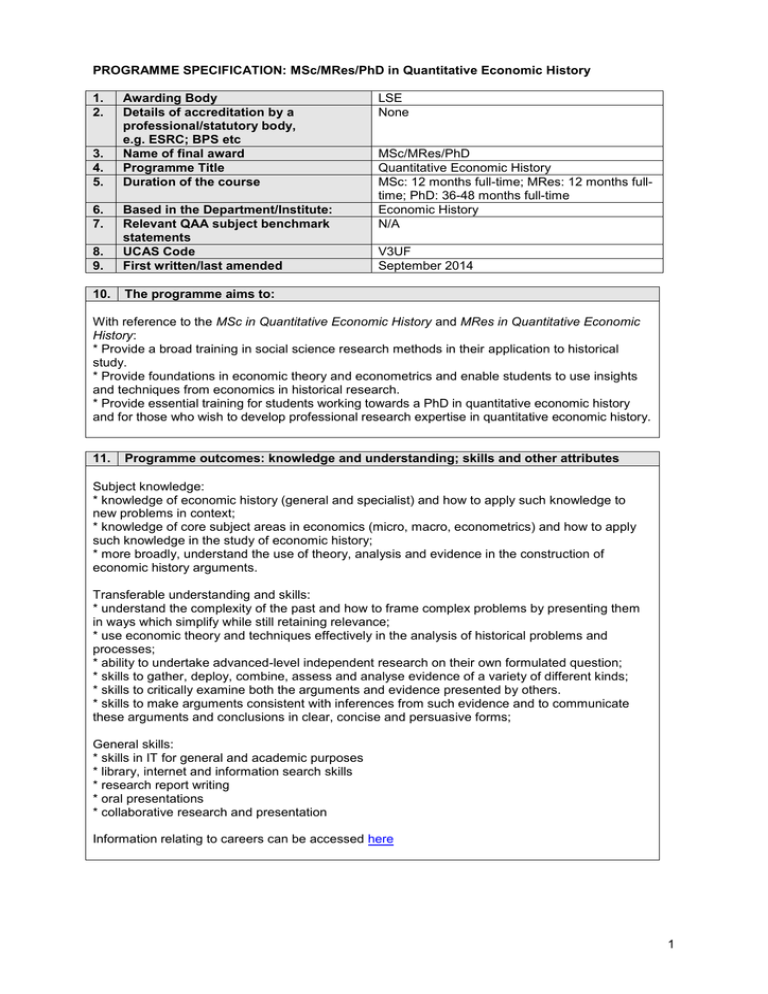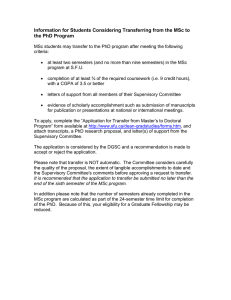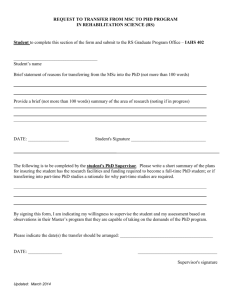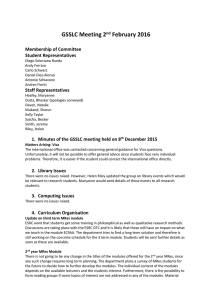PROGRAMME SPECIFICATION: MSc/MRes/PhD in Quantitative Economic History 1. Awarding Body
advertisement

PROGRAMME SPECIFICATION: MSc/MRes/PhD in Quantitative Economic History 1. 2. 3. 4. 5. 6. 7. Awarding Body Details of accreditation by a professional/statutory body, e.g. ESRC; BPS etc Name of final award Programme Title Duration of the course 8. 9. Based in the Department/Institute: Relevant QAA subject benchmark statements UCAS Code First written/last amended 10. The programme aims to: LSE None MSc/MRes/PhD Quantitative Economic History MSc: 12 months full-time; MRes: 12 months fulltime; PhD: 36-48 months full-time Economic History N/A V3UF September 2014 With reference to the MSc in Quantitative Economic History and MRes in Quantitative Economic History: * Provide a broad training in social science research methods in their application to historical study. * Provide foundations in economic theory and econometrics and enable students to use insights and techniques from economics in historical research. * Provide essential training for students working towards a PhD in quantitative economic history and for those who wish to develop professional research expertise in quantitative economic history. 11. Programme outcomes: knowledge and understanding; skills and other attributes Subject knowledge: * knowledge of economic history (general and specialist) and how to apply such knowledge to new problems in context; * knowledge of core subject areas in economics (micro, macro, econometrics) and how to apply such knowledge in the study of economic history; * more broadly, understand the use of theory, analysis and evidence in the construction of economic history arguments. Transferable understanding and skills: * understand the complexity of the past and how to frame complex problems by presenting them in ways which simplify while still retaining relevance; * use economic theory and techniques effectively in the analysis of historical problems and processes; * ability to undertake advanced-level independent research on their own formulated question; * skills to gather, deploy, combine, assess and analyse evidence of a variety of different kinds; * skills to critically examine both the arguments and evidence presented by others. * skills to make arguments consistent with inferences from such evidence and to communicate these arguments and conclusions in clear, concise and persuasive forms; General skills: * skills in IT for general and academic purposes * library, internet and information search skills * research report writing * oral presentations * collaborative research and presentation Information relating to careers can be accessed here 1 12. Teaching, learning and assessment strategies to enable outcomes to be achieved and demonstrated The proposed degree programme comprises three successive stages: 1) MSc in Quantitative Economic History (year 1) 2) MRes in Quantiative Economic History (year 2) 3) PhD (years 3-5). Progression from each stage to the next is dependent on success in the relevant end of year examinations (progression rules are set out under 3.6 of the New Programme Proposal Form). There is no direct entry into either the MRes or PhD. In the first stage (MSc), the programme includes compulsory core courses in economic history (one half-unit, one full-unit course) and in economics (two full-unit courses), and an essay/project in quantitative economic history (half-unit). Teaching on the economic history core courses covers the role of theory in historical analysis; the nature of historical analysis; explanation in economic history, and the use of quantitative techniques (cross-section analysis, time-series analysis, panel data) in historical enquiries. This is complemented by core teaching in economics (either micro- or macroeeconomics) and econometrics. The training provided through the delivery of these core courses aims to increase students’ methodological competencies and to assist and inform their project work in quantitative economic history (half-unit, c. 6,000 words). Building on the foundations laid with the successful completion of the MSc, teaching provision in the MRes stage (year 2) broadens to include substantive economic history courses - defined by a combination of theme, geographical area and historical period - as options (courses to the value of two full-units). This is complemented by another economics core course (either micro- or macroeeconomics, depending on which one has already been taken at the MSc stage). Drawing on the initial training provided at MSc level and the additional knowledge and further analytical skills acquired in the taught courses at MRes level, students complete a major Research Paper (full-unit, c. 10,000 words) and a Research Prospectus (half-unit, c. 5,000 words, non-examinable but subject to approval by a departmental board). The purpose of the Research Prospectus is to map out the prospective PhD thesis and to demonstrate its feasibility. In both stages (MSc and MRes), all full-unit courses last 20 weeks and are taught in combinations of lectures and seminars, depending on the material. Core course and overview material is typically delivered by means of lectures. For all courses, students learn how to work with the materials and develop both their knowledge and skills in seminars groups. All taught courses have written work requirements during the course and students are given feedback on their work. The courses are assessed by written examination in the Summer Term. An important component in students’ learning is provided by their undertaking (an) independent, but closely supervised research project(s) on an economic history topic in a structured way according to a timetable. At the MSc level, that takes the form of a relatively short, self-contained essay in economic history – in a way, a first hands-on exercise in using quantitative methods in historical research. At the MRes level, the intellectual demands are higher with both a more ambitious 10,000 word project that is informed by economic theory and involves the quantitative analysis of original data and its historical interpretation, and a 5,000 word Research Prospectus. The aim here goes beyond merely examining one key component of the MRes. Taken together, the project and prospectus also serve to ascertain the students’ readiness for further graduate work at PhD level in terms of his/her intellectual development and the quality of the prospective thesis. Following initial consultations with supervisors and preliminary work during Michaelmas and early Lent Term, students present a title/research topic for their MSc essay and MRes project by the middle of the Lent Term for formal approval. At the end of the Summer term, all students take part in an all-day (MSc and MRes) workshops in which they present their draft MSc essays and MRes projects respectively and comment on each others’ drafts. Faculty are also present to provide further critical feedback. These workshops provide an invaluable learning opportunity, and, along with the supervisor’s comments on their written drafts (to be submitted by week 8 of the Summer Term), provide students with the basis for further revisions before the submission of their MSc essays and MRes projects and prospectuses at the beginning of September. The structure and timetable are designed so that students get the supervision and feedback during the period to acquire the subject knowledge and understanding required for the essay, research paper and research prospectus, respetively. 2 All courses and components are taught by LSE faculty or visiting teachers and post-doctoral researchers. All students are allocated to a member of the teaching faculty for individual supervision and dissertation supervision. Visitors and research faculty are also available to provide further expertise for dissertation research. The MSc Tutor and, where appropriate, Research Student Tutor provide support to all students in respect of course choice and any other programme issues. Stage 3 (PhD): Students who have successfully passed the MRes and met the progression criteria (set out under 3.6 of the New Proposal Form) can transfer unconditionally into the PhD programme and will be registered as PhD students (as distinct from initial MPhil registration). Typically, students taking the MRes/PhD pathway are expected to produce a paper-based PhD thesis that comprises of three publishable research papers with appropriate linking material (as distinct from a traditional monograph-style dissertation). All PhD students are expected to attend the graduate workshop (EH590) throughout their period of registration at LSE, and to participate in a range of seminars in the wider research community. Each student is assigned a supervisor or supervisors – normally at least one of them who has been previously supervising the student’s work on the MRes Research Project and Research Prospectus. They are responsible for overseeing the formulation, conduct and completion of the student’s PhD research. Building on their formal training provided through the MRes, students further develop their research skills and scholarly abilities in the PhD programme primarily through apprenticeship work under the guidance of a master craftsperson – namely their supervisor(s).The supervisor is expected to help the student in refining their research topic and guiding them through the literature in the initial months of their thesis. At the same time, students are taking the course EH520 where they learn from other faculty members, and from each other, about the various different ways in which professional work in economic history is carried out, partly by analysis of existing work, and partly by developing their own research design ideas within the context of the course. As time progresses, the role of the supervisor changes from leading the student into the field to providing the critical analysis of the student’s work. During their studies, students also gain professional experience in how to present their work at the graduate workshop (EH590), how to be a discussant and how to chair such seminars. Students’ progress at PhD level is assessed by the Department in two ways: a) through the Supervisor and the Research Student Tutor. The Supervisor monitors the academic progress of the student, and submits a written report on their progress on an annual basis. Any problems are reported to the Research Student Tutor. Students funded by the ESRC also have to make an annual report to ESRC. The Research Student Tutor has an overview of the progress of all research students, and also supports them in a range of matters such as applications for financial support. b) through the Graduate Research Committee (GRC), which is chaired by the Research Student Tutor. Unlike students following the traditional (and continuing) MPhil/PhD pathway, students who enter into the PhD programme via the MRes route are not subject to initial GRC review for re-registration and up-grade to PhD status. Completing the MRes and meeting the progression standards required is equivalent to passing the traditional up-grade review. However, students entering the PhD programme via the MRes route have to present their work to the GRC and will be interviewed by the GRC in the Summer Term of their second year on the PhD programme for an assessment of their progress (mid-programme review). Thereafter and for students experiencing real difficulties in keeping to their timetable for completion, or if a supervisor is particularly worried about their progress, the GRC will convene on an ad hoc basis to consider the student’s progress . This may involve interviewing the student, reading his/her written work to date and considering supervisors’ views before making suggestions on ways of aiding the student’s progress. 13. Programme structures and requirements, levels, modules and awards MSc in Quantitative Economic History MRes/PhD in Quantitative Economic History 3 Additional information 14. Criteria for admission to the programme Upper Second Class BSc in Economics (or closely related discipline) or Economic History and a strong record in undergraduate-level mathematics and statistics. All prospective students must take EC400: Introductory Courses in Mathematics and Statistics (taught pre-session in September) and pass at the standard required before final admission to the MSc/MRes. Students who do not pass EC400 but otherwise meet all admissions criteria will be offered a place on the one-year MSc Economic History (Research) and have the opportunity to take the MPhil/PhD route rather than the MRes/PhD route. 15. Indicators of quality ESRC 1+3 recognition and success in gaining such awards for students in the already established MSc Economic History (Research) taught in the department. Consistent positive External Examiners’ reports on other Master’s degree programmes in the department and performance of students. RAE 5* and 5 in the last two assessments respectively. In combination, the proposed MSc and MRes in Quantitative Economic History offer unique, specialised training for those students wishing to go on to do a PhD in quantitative economic history that requires strong foundations in economic theory and econometrics and the ability to make these ‘count’ in historical research. Members of the department serve on the council, executive committee and/or board of trustees of the Economic History Society as well as the European Historical Economics Society and many editorial boards in the field. The LSE Careers Centre website provides data on career destinations of LSE graduates. 16. Methods for evaluating and improving the quality and standard of teaching and learning The programme is subject to the School’s overall mechanisms for quality evaluation and improvement. In addition, we have departmental mechanisms as follows: We use three mechanisms to review quality and initiate improvement. a) Review by the Convenor in conjunction with the Department’s MSc Tutor, the Department’s MSc Exam Chair and the Department’s Research Student Tutor; b) Review by the Departmental Teaching Committee; and c) Review by course teachers. The first two mechanisms (a) and (b) are used to evaluate and improve the quality of teaching, programme offerings, programme design, and assessment. Minor changes are initiated by advice from office holders to the department; major changes are decided by the department as a whole (often following a small committee review). The third mechanism (c) is used by individual teachers to improve course quality and design. Our mechanisms make use of information and advice given by External Examiners reports; TQARO student opinion surveys; our post-graduate staff-student committee meetings; individual student feedback; and our own course and programme level reviews. School mechanisms (*operate at departmental level): * regular staff appraisal* * induction and mentoring* system * student survey by TQARO * external examiner check-up system by TLAC * review of all new courses and programmes, and major modifications, by GSSC * full departmental TLAC review every 5 years 4


